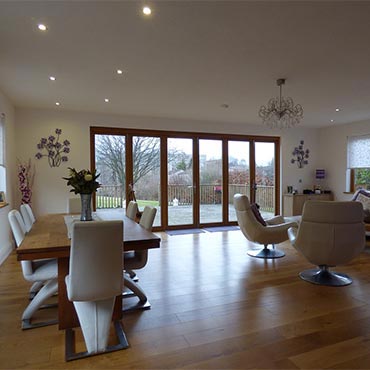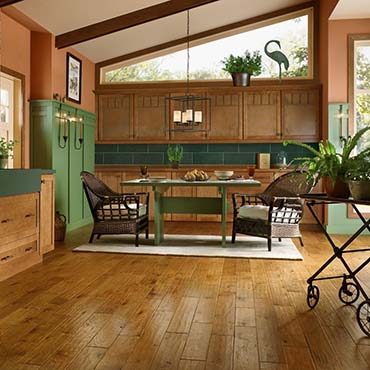Engineered Plank Flooring

Engineered Elegance: Revolutionizing Interiors with Engineered Plank Flooring
In the dynamic world of interior design, the quest for both aesthetics and functionality is perpetual. Amidst this pursuit, Engineered Plank Flooring (EPF) has emerged as a revolutionary element, profoundly influencing modern interior spaces. This article delves into the essence of EPF, its diverse types and species, and its significant role in elevating interior design.
Defining Engineered Plank Flooring
Engineered Plank Flooring refers to a composite
flooring product, consisting of multiple layers. The core layer is typically made of plywood or high-density fiberboard, which is then topped with a thin layer of natural hardwood. This structure imparts EPF with exceptional stability and resistance to environmental changes, distinguishing it from traditional solid
hardwood floors.
Types and Species
EPF comes in an array of types and species, catering to diverse aesthetic and functional needs. Popular species include oak, maple, and hickory, known for their durability and distinctive textures. Exotic woods like Brazilian cherry and acacia offer unique color variations and patterns, providing an array of choices for designers.
Versatility and Durability
One of EPF's most lauded attributes is its versatility. It can replicate the look of solid hardwood without the associated limitations, making it suitable for a wide range of environments, including moisture-prone areas like basements and
bathrooms. Its durability is also noteworthy; the engineered structure provides enhanced stability and resistance to warping or buckling, a common issue with solid wood in fluctuating climates.
Sustainability and Environmental Impact
Sustainability is a pivotal consideration in modern design. EPF scores high in this aspect, as the thin hardwood veneer uses less of the slow-growing, valuable hardwoods compared to solid wood floors. Additionally, many manufacturers now source wood from sustainably managed forests, further reducing the environmental footprint.
Enhancing Interior Spaces
EPF offers a blend of beauty and practicality. It can seamlessly integrate with various design themes, from rustic to contemporary. The wide range of finishes and textures available allows designers to create custom looks tailored to specific spaces. Its ability to mimic other wood species makes it a versatile choice for achieving high-end looks without the corresponding price tag.
Selection Tips for Professionals
For interior designers, decorators, and design consultants, selecting the right EPF involves considering both aesthetic and practical factors. They should evaluate the hardness and durability of the top layer, especially for high-traffic areas. Understanding the installation methods (floating, glue-down, or nail-down) is also crucial. Additionally, considering the plank size and finish in relation to the room's size and
lighting can greatly influence the overall ambiance.
Features and Benefits
The benefits of EPF extend beyond its visual appeal. It's easier to install and maintain compared to solid wood floors. The pre-finished planks ensure a consistent and long-lasting finish. Its compatibility with underfloor heating systems further adds to its appeal in modern homes.
Current Trends and Innovations
Recently, there has been a surge in demand for wider and longer planks, which create a sense of openness and fluidity in spaces. Grey and whitewashed tones are gaining popularity, complementing minimalist and Scandinavian-inspired designs. Innovations in surface textures, such as hand-scraped or brushed finishes, are adding character and depth to floors.
EPF is also seeing advancements in materials. The incorporation of recycled materials and the development of more efficient manufacturing processes are making EPF an even more attractive option for environmentally conscious consumers.
Impact on Interior Decor
Engineered Plank Flooring is not just a flooring choice; it's a design statement. It sets the tone for a room, influencing the choice of
furniture, textiles, and accessories. Its versatility in mimicking various wood types and finishes allows for creative freedom in design, making it a favorite among interior design professionals.
Conclusion
In conclusion, Engineered Plank Flooring is a testament to the innovation in interior design. It offers the perfect amalgamation of beauty, durability, and sustainability, making it an ideal choice for modern interiors. As it continues to evolve, EPF is poised to remain a central element in the design vocabulary of professionals, continually redefining the aesthetics and functionality of interior spaces.
Disclaimer: The information provided in this article is for general informational purposes only. While we strive to ensure the accuracy and reliability of the information presented, we make no warranties, express or implied, about the completeness, accuracy, reliability, suitability, or availability with respect to the content. Any reliance you place on such information is strictly at your own risk. We recommend consulting with professionals for specific advice tailored to your project’s needs, particularly regarding building codes, regulations, and product specifications.
Under no circumstances shall we be liable for any loss or damage, including without limitation, indirect or consequential loss or damage, arising from the use of, or reliance on, the information provided in this article.









